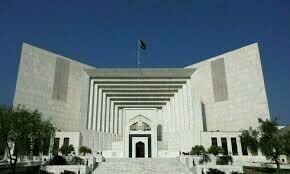Two Supreme Court judges on Monday withdrew a contempt notice issued a week ago against a senior staff member for not fixing a case regarding the jurisdiction of regular benches.
The decision came as a two-judge bench, comprising Justice Syed Mansoor Ali Shah and Justice Aqeel Ahmed Abbasi, pronounced its verdict on contempt proceedings against Additional Registrar (Judicial) Nazar Abbas, who the court office removed on Tuesday.
The contempt notice had been issued when a case about whether SC’s regular benches could determine the constitutionality of the Constitution’s Article 191A — under which the constitutional bench was established after the 26th Amendment — was not fixed for hearing on January 20 as ordered by the bench.
During today’s hearing, Justice Shah observed, “The court has arrived at the conclusion that the additional registrar (judicial) did not deliberately violate the court orders.”
He further stated that neither the apex court find any proof that showed that the SC official had any personal interest in the case nor was any evidence found of any “ill intent”.
“There is no indication of mala fide intent in his actions,” stated a 20-page verdict issued by the court.
Subsequently, the senior puisne judge announced that the bench was withdrawing the show-cause notice over contempt of court against Abbas.
Justice Shah noted that the bench deliberated on two questions that had been framed earlier — one about delisting a case from a bench that it had already partially heard and the other about invalidating a court order through an administrative order.
Answering the first question, Justice Shah said the court concluded that such a case could not be taken back from the bench or delisted. About the second, he noted that a judicial order could not be nullified by an administrative order.
“It can be held unequivocally that no administrative authority, including the Committees constituted under Section 2 of the Act and 191A of the Constitution, can, by an administrative order, undo the effect of a judicial order,” the court judgment read.
Meanwhile, the bench referred the matter to Chief Justice of Pakistan (CJP) Yahya Afridi to deliberate whether a full court was needed to decide if contempt proceedings were needed against two committees of the apex court.
Last week, Registrar Muhammad Saleem Khan had explained that the case was not fixed on January 20 because of two decisions — by the regular committee constituted under Section 2 of the SC Practice and Procedure Act, and the constitutional committee set up under Article 191(A)(4) of the Constitution.
Today’s order stated: “We find that it was the administrative decisions of the committees that illegally nullified the judicial orders and unlawfully deprived the regular bench of its judicial power to decide the jurisdictional question raised before it.”
The bench further said it appeared that the “matter has to proceed further against the members of the two committees” that had delisted the case from the regular bench.
However, terming the matter as serious and “warranting the collective and institutional deliberation” of all SC judges, the bench stressed: “Judicial propriety and decorum demand that the said question be considered and decided by the full court.”
It then referred the request to form a full court to CJP Afridi.
Moreover, the judges ordered that the main case during which the question of jurisdiction had been raised be fixed before the original three-member bench that was hearing it — comprising Justices Shah, Ayesha A. Malik, and Irfan Saadat Khan — in the first week of February.
The question of jurisdiction had arisen on January 13, when a three-judge bench led by Justice Shah heard the federal government’s petition against a Sindh High Court’s decision to strike down Section 221-A(2) of the Customs Act, 1969. The applicant had argued that the regular bench could not hear the case as it involved challenges to the constitutionality of laws.
During previous hearings, which also witnessed some changes in the bench, the SC had appointed four senior counsels as amici curiae to assist the court.
Hearing on pleas against 26th Amendment adjourned for 3 weeks
In a separate development, an eight-judge constitutional bench, headed by Justice Aminuddin Khan, finally took up several challenges to the 26th Amendment.
The court issued notices to respondents on applications seeking the formation of a full court to hear the matter and live-streaming of proceedings in the case.
Subsequently, the matter was adjourned for three weeks.
Several petitioners, including high court bar associations, had requested the SC to constitute a full court to hear the matter instead of the constitutional bench established under the 26th Amendment, which itself was being challenged.
Senior counsels Hamid Khan, Faisal Siddiqui, Barrister Salahuddin Ahmed and Uzair Bhandari were among those who appeared before the court today.
When lawyers requested the bench that a full court be convened to hear their petitions, Justice Jamal Khan Mandokhail responded that it could not be done at the moment.
He explained that the Judicial Commission of Pakistan (JCP) named the judges for the constitutional bench and all those named by it were part of the presiding bench. While the judges were named by the JCP, cases were fixed for hearing by a three-member committee, Justice Mandokhail added.
Here, Justice Muhammad Ali Mazhar remarked that the lawyers were “confused” about the matter of full court. “You may consider this bench as a full court,” he said.
At the petitioner lawyers reiterating their request, Justice Mazhar stated that it was “not possible at the moment”.
Justice Ayesha Malik, however, noted: “There is no prohibition on convening a full court.”
Advocate Siddiqui then contended that the 26th Amendment was against the trichotomy of powers, while Bhandari claimed that the parliament was “incomplete” when the legislation was passed.
Upon Justice Mandokhail asking whether the votes for the amendment were counted based on the total number of lawmakers or those present at that time, Siddiqui replied that it was based on those available.
The judge further inquired whether the number of lawmakers present amounted to two-thirds of a house of the parliament, at which Siddiqui said: “They had completed the numbers. We are not raising this issue.”
Here, Justice Ayesha asked whether all provinces had complete representation in the parliament. Siddiqui then pointed out that the number of senators from Khyber Pakhtunkhwa was not complete, stating that the polls for those seats had not been held yet.
At this point during the hearing, Ahmed highlighted that the petition filed by senior politician Akhtar Mengal detailed the situations in which the 26th Amendment was passed.
“It should also be considered how free the [National] Assembly members were in casting their votes,” he asseted.
This prompted Justice Ayesha to observe that the SC’s verdict from last year in the reserved seats case, which had declared the opposition PTI eligible to reserved seats, had “not been implemented either”.
Barrister Ahmed responded that his petition had also touched upon the reserved seats matter, asking how any amendment could be passed by an incomplete parliament.
Shahid Jameel, another lawyer, contended: “Only the public’s representatives have the power to pass a constitutional amendment.”
At this, Justice Mazhar asked Jameel whether he wanted cases relating to the 2024 general elections to be decided first before hearing pleas against the amendment. He remarked that doing so would put the 26th Amendment case in pending for a long time.














































